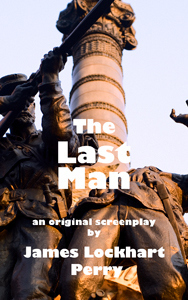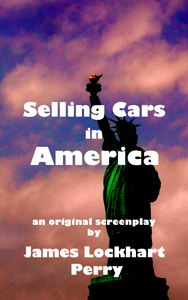Screenplays
 Lockhart never seriously considered producing the movies or even working in Hollywood, but loved the form and saw it as an excellent tool for sharpening his plotting and characterization skills. As in all things, Lockhart allowed the mental exercise to carry him away, and before he knew it, had seven professional-strength stories all dressed up with nowhere to go. But at least he had all kinds of fun along the way.
Lockhart never seriously considered producing the movies or even working in Hollywood, but loved the form and saw it as an excellent tool for sharpening his plotting and characterization skills. As in all things, Lockhart allowed the mental exercise to carry him away, and before he knew it, had seven professional-strength stories all dressed up with nowhere to go. But at least he had all kinds of fun along the way.
The following are some of the more polished efforts:
900 Miles
A Family History
 A mother, son, and daughter walk 900 miles through France to escape the holocaust. Sixty years later, their heirs still deal with the consequences.
A mother, son, and daughter walk 900 miles through France to escape the holocaust. Sixty years later, their heirs still deal with the consequences.
Rachel Blaustein is a lonely old woman living in a hotel in Switzerland, estranged from her daughter Marnie, and an unknown quantity to her grandchildren, Jake and Allie. She discovers that she’s going to die and realizes that she first needs to make peace with her family.
The ensuing reunion is anything but peaceful. Marnie is the mirror image of her mother, with the same unfortunate blend of anger and cold steel. They hate the loss of each other, but the issues that divide them remain huge. And those issues boil down to what happened to Rachel in the war.
In 1940, the Jewish Rachel escaped the Nazis by walking 900 miles with her mother and brother from Belgium to Switzerland. Along the way, Rachel stumbled into the Dunkirk evacuation, was lost, imprisoned, and released, shot at by soldiers and fighter pilots, nearly executed as a looter, and almost killed in a car wreck. And all before her fifteenth birthday.
The deprivations that wore down Rachel’s mother and brother transformed her instead into a young woman of astonishing strength—and hardness. The final betrayal at the Swiss border forever changed her relationship with the brother she once idolized and sent her rocketing inevitably into a thirty-year collision course with her daughter.
Rachel understands that the only way into her daughter’s heart lies through her grandchildren. Yet those children, naïve and sheltered though they might be, have as much to teach their mother and grandmother as they have to learn about who they are and where they come from.
Click on cover to read an excerpt.
Milk and Cookies
An Intermittently Romantic Comedy
 The girl of our looniest dreams saves the lamb of hers from a nightmare of mob family values.
The girl of our looniest dreams saves the lamb of hers from a nightmare of mob family values.
When it comes to falling in love, Tammy Whinot will stop at nothing. No matter that she meets Mr. Perfect just as he’s robbing and shooting it out with a Chechen convenience store owner. Or that five minutes later, her poor Joe Lamb takes a leap over a speeding Porsche into a coma and a stint in a wheelchair. Or that the fixer-upper Tammy buys Joe contains a family of ghosts trapped in a purgatory of puzzling tribulations. Or that tribulato numero uno is the mobster Tony Ten Finger’s obsession with recovering the $9.5 million cash those ghosts embezzled from him.
What a girl needs in this dating hell we live in are great instincts, and Tammy has some of the finest. She can see past Joe’s suicidal tendencies to the pot of dull stability that lies beneath. She can charm a family of irritated ghosts into defending her to the—uh—death against a swarm of gangsters. She can spot the rose in a patch of weeds, the hope in a broken bicycle, the love in a mistreated child, and the courage in a frightened coward.
If the finest quality of an American hero is an absolute faith in humanity, Tammy makes the grade with powers to spare. Don’t misunderstand her—sooner or later everybody does something awful—Tammy herself isn’t above a little kidnapping, blackmail, and grand larceny—but the trick in love and life is to find someone who does bad things badly and ugly things worst of all.
Click on cover to read an excerpt.
The Perfect Moment
A Comedy in Spite of Itself
 A writer races to scribble the perfect literary moment before an evil psychiatrist electro-shocks all of his characters into oblivion.
A writer races to scribble the perfect literary moment before an evil psychiatrist electro-shocks all of his characters into oblivion.
Alex is a failed writer whose mind see-saws through multiple levels of reality. At one level, he’s a grungy postal worker living in a ratty apartment and launching his characters into an unforgiving literary world. He loves his characters, but unfortunately, power corrupts, and Alex’s power over his creations corrupts absolutely. He forces them into behaving like rank clichés, but when they argue with him, they quickly find themselves on the wrong end of his literary forty-five.
On this same plane, Alex has a sweet, tolerant girlfriend Sally who works with him at the post office and wants him to move in. But a Marlene Dietrich look-alike upsets everything by hiring him to find her husband’s murderer. When Alex rebuffs her romantic advances, she frames him for murder and talks the police into shooting him full of holes.
Except the next morning, Alex wakes up in a lunatic asylum where Dietrich is the evil psychiatrist, Sally is the head nurse, and Alex’s fellow inmates surprisingly resemble his characters. Alex realizes that his failure as an artist is responsible for his incarceration. That failure can only be redeemed by writing real people. But Dietrich’s mission in life is to shock all the writer nonsense and out of Alex’s head so he can support the family that despises him.
When Alex finally starts to fight back with real characters, Dietrich ups the ante with a full frontal lobotomy. The question becomes: Can Alex and his creations put together the perfect literary moment before Dietrich finishes sharpening her knife?
Click on cover to read an excerpt.
The Last Man
A Pseudo-Comic Fairy Tale
 A friendly lunatic and an angry Latina cruise the world picking up survivors after a global biological meltdown.
A friendly lunatic and an angry Latina cruise the world picking up survivors after a global biological meltdown.
A Chinese accident and a clumsy American response set off a worldwide biological meltdown. At the Maryland Retreat for the Criminally Insane, Hudson finds out he’s the last human being alive. Fortunately, he’s misinformed. When he travels to Washington and moves into the newly available White House, he finds a gorgeous Latina named Sandy alive and stuck in an air lock down in the Situation Room.
Hudson and Sandy fall for each other, even though he has no principles and she has too many. Sandy is all about anger—she expects the world to live up to her standards, and when it doesn’t, she blows all fuses. Hudson is a disappointed romantic who immediately falls for Sandy’s finer qualities. She eventually responds, although, as she never fails to remind him, it doesn’t hurt Hudson’s chances that he’s the only man alive.
Hudson and Sandy fly off to Europe, where they find a French society dame, a singing Italian restauranteur, and a pudgy 16-year-old Nigerian genius. With these as the core of their new civilization, they return to Washington to find Augusto Pinochet, the supposedly dead ex-President of Chile, very much alive and installed in the White House. Pinochet has assembled a crack team of Bulgarian and Sri Lankan commandos (one of each) and invaded the United States. He fends off Hudson with a seemingly invincible political strategy–everyone can do whatever the hell they want, as long as he gets to hang onto the Oval Office and most of the weapons.
With Sandy’s help, Hudson overcomes Pinochet, finds 232 other survivors, and instigates the Great American Shootout, in which every weapon in America is found and exhausted. Over the years, Hudson rebuilds society in his own image—over-fed, over-sexed, happy-go-lucky, and deaf from all the explosions.
Click on cover to read an excerpt.
Selling Cars in America
An Original Screenplay
 When a private-eye mom tangles with high-society corruption, her worried used-car-salesman husband finds a baby-sitter and motor-mouths to the rescue.
When a private-eye mom tangles with high-society corruption, her worried used-car-salesman husband finds a baby-sitter and motor-mouths to the rescue.
George Singer might just be the nicest guy on the planet. But when high society deviants start kidnapping and shooting at his wife Helen, even he finds it hard to keep his cool.
It all starts when Helen drops Gracie off at school and goes to work as a private-eye snapping lurid photos of the serial gigolo, Richard Allbright. Helen gets the photos and strikes a low blow for common decency, but then Felicity, the aggrieved wife and wealthy provider, decides to do nothing. End of story, right?
Wrong. Richard wants his pictures back so he can get on with his debauchery. Gaston, the fired butler, has his own agenda and a blustery ruthlessness to match. Felicity’s bodyguards would sooner kill than lose their jobs. Felicity just wants is to bottle the whole thing up and doesn’t give a damn who dies along the way.
In the end, it takes all of George’s used-car-sales persuasive powers to talk everyone out of letting their histories destroy their futures. But as Richard puts it, “George! Give it a rest, will ya? There are some cars you just can’t f—ing sell!”
Click on cover to read an excerpt.
Filed under: Screenplays Tagged: Featured




